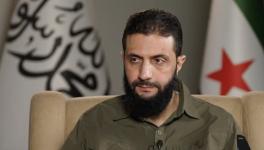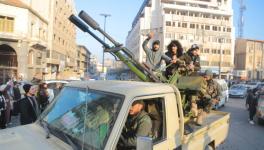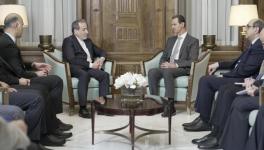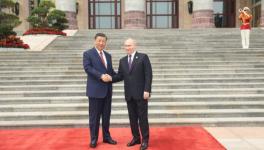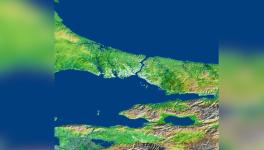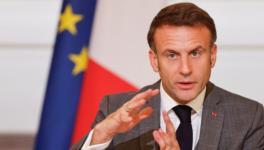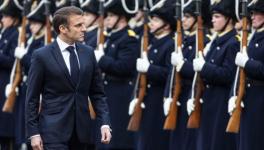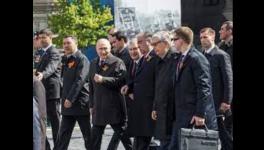Trump Believes in a World Order Based on Brute Force
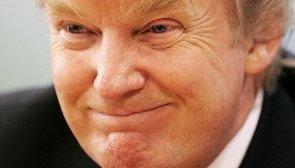
Photo Credit: Sách DOANH TRÍ / Flickr
President Donald Trump has failed to reassure members of the North Atlantic Treaty Organisation (NATO) that the United States was fully committed to the alliance. When pressed about the importance of Article 5 of the NATO charter—which obliges members to ensure collective defence—Trump dithered. No clarity was possible. He wants NATO members to increase military spending. It is something the U.S. needs little prodding to do by itself.
Trump wants the U.S. to spend over $700 billion on its military, which is astronomically higher than any of the other NATO states. The U.S. expenditure is two-thirds of the total the 28 NATO states spent on their militaries. The U.S. spends 3.6 per cent of its gross domestic product (GDP) on the military, almost twice the 2 per cent standard asked of NATO states. The U.S., by itself, is effectively the military arm of the NATO.
NATO’s Article 5 has been triggered only once—after the attacks on September 11, 2001, to ensure NATO support in Afghanistan. NATO has been involved in several wars, from Yugoslavia to Libya, but this was without the invocation of Article 5. More than anything, Trump’s reticence to endorse Article 5 says a great deal about the U.S.’ frustration with its allies. Notions of U.S. supremacy endure amongst the U.S. foreign policy elite. Fingers on the trigger, they prod states such as North Korea and Iran, which they had designated 20 years ago as “rogue states”. American warships continue to threaten the coastlines of these countries, sitting provocatively in the narrow Sea of Hormuz (near Iran) and in the Sea of Japan (near North Korea).
Europeans are not entirely given to the more belligerent aspects of U.S. policy, although they do not argue against the theory that these states need to be contained. It is Europe’s reliance on U.S. power that makes it grouse about Trump’s refusal to fully endorse Article 5. The gap between Europe’s view of the world and that of America is largely irrelevant. At the end of the day, Europeans line up quite evenly behind U.S. policy.
European silence
On May 25, the U.S. Defence Department acknowledged that in March one of its aircraft had dropped a bomb on the al-Jadidah neighbourhood in Mosul (Iraq), killing 105 civilians. The target was two Islamic State (I.S.) snipers. The massive GBU-38 500-pound bomb pulverised two buildings, killing civilians who had sought shelter there. There was little evidence on the ground that this was an I.S. weapons storage area, as claimed by the Defence Department. A few days later, in al-Mayadeen in Syria, an aerial attack killed 106 civilians, including 42 children.
During his election campaign last year, Trump said that he would “bomb the shit” out of the I.S. He has given his generals “total authorisation” to act, which has translated into a 50 per cent increase in bombings in 2017 from previous years. This amounts to close to 15,000 bombs in the first four months of the year. While the I.S. has lost territory as a result of this bombardment, the civilian toll has also risen dramatically.
The European Union’s (E.U.) foreign affairs chief, Federica Mogherini, is otherwise quick to denounce human rights violations, such as those committed by the government of Bashar al-Assad in Syria. No such swiftness is detected when evidence is plainly available about civilian casualties from American bombs. This silence is partly because several European countries have also been implicated in the killing of civilians in Syria. An investigation by Airwars, which tracks civilian casualties in West Asia caused by air strikes, said at least 80 people were killed in bombing raids conducted by Belgium, France, the Netherlands and the United Kingdom.
The British have been adamant that they have killed no civilians in the 1,300 raids that they have conducted. Airwars asked the British Ministry of Defence about 120 incidents in 2016 where civilians were likely injured or killed. British officials said that “we cannot make any definitive assessment of possible U.K. presence from the evidence”. This is a guarded and bureaucratic way of saying that the U.K. refuses to make any direct statement about civilians killed by its raids.
Interestingly, it is the U.S. that has sought to highlight the civilian casualties that resulted from the bombings by its European coalition partners. A U.S. military official said he was frustrated by the sanctimoniousness of the Europeans. “They blame us for everything, when they are also part of our war efforts,” he said. If the Europeans could be properly implicated in the riot of civilian casualties in Syria, Iraq and Afghanistan, the U.S. military feels that it would be under less pressure to answer for its own damaging record. It is true that the Europeans are generally smug about issues of human rights. A British investigation is ongoing into alleged abuses by 120 Royal Military Police between 2005 and 2013. The outcome of the investigation will likely be as muddy as that of the investigation against SAS soldiers who were accused of war crimes in Afghanistan. Last year, the European Court of Human Rights in Strasbourg, France, set aside an accusation that Dutch troops had committed war crimes in Srebrenica in Bosnia & Herzegovina in 1995 by forcing civilians out of the safety of the United Nations compound. This is part of a pattern of protection for European soldiers, a way to protect the idea that Europe is incapable of human rights violations.
Coverage of Trump’s visit to the G7 summit could not help but focus on his own antics. Trump shoved aside Dusko Markovic, the Prime Minister of Montenegro, to get to the front of a photograph. He preened and poked, grabbed hands and shook them with ferocity, walked around like he owned Europe, and bragged about business deals in Scotland and his friendship with celebrities. Trump was like the ugly American, the figure of scorn for Mark Twain and a reference to the boorish American traveller “who talked very loudly and coarsely and laughed boisterously where all others were so quiet and well-behaved”. It was easy to mock all this but harder to cover the underlying issues, notably Europe’s well-heeled subservience to U.S. policy and its own ghastly record in the War on Terror.
German Chancellor Angela Merkel went on a campaign tour after the G7 summit. “The times in which we can fully count on others are somewhat over,” she said. “Europeans must really take our destiny into our own hands.” Even if this was said with the full weight of an election campaign behind it, and should therefore be taken with a pinch of salt, it indicates Germany’s frustration with Trump’s consistent prodding about trade unfairness and the U.S. military expenditure that enables NATO to function as a global power. It is unlikely that Europe will be able to take action to create an independent military force, which is precisely what the U.S. did not want in 1949 when NATO was created. There is simply no combined will in Europe, already rattled by Brexit, to produce a European military. There is even less determination in Europe to actually alienate itself from the U.S. NATO will remain intact and the U.S. will continue to play a major role in pushing up against Russia in the east.
European leaders seemed to smirk when Trump suggested that NATO should concentrate on “terrorism and immigration”, the connection between the two going against the ethos of European liberalism. But in practice, the European states have made precisely this linkage. It suggests that beneath the European claim to being the planet’s champion of human rights lies a singularly ugly truth—that Trump is the id to Europe’s superego, the instinct that drives policy rather than the morality that screens the reality.
Vijay Prashad is professor of international studies at Trinity College in Hartford, Connecticut. He is the author of 18 books, including Arab Spring, Libyan Winter (AK Press, 2012), The Poorer Nations: A Possible History of the Global South (Verso, 2013) and The Death of a Nation and the Future of the Arab Revolution (University of California Press, 2016). His columns appear at AlterNet every Wednesday.
This article was made possible by the readers and supporters of AlterNet.
Disclaimer: The views expressed here are the author's personal views, and do not necessarily represent the views of Newsclick
Get the latest reports & analysis with people's perspective on Protests, movements & deep analytical videos, discussions of the current affairs in your Telegram app. Subscribe to NewsClick's Telegram channel & get Real-Time updates on stories, as they get published on our website.









